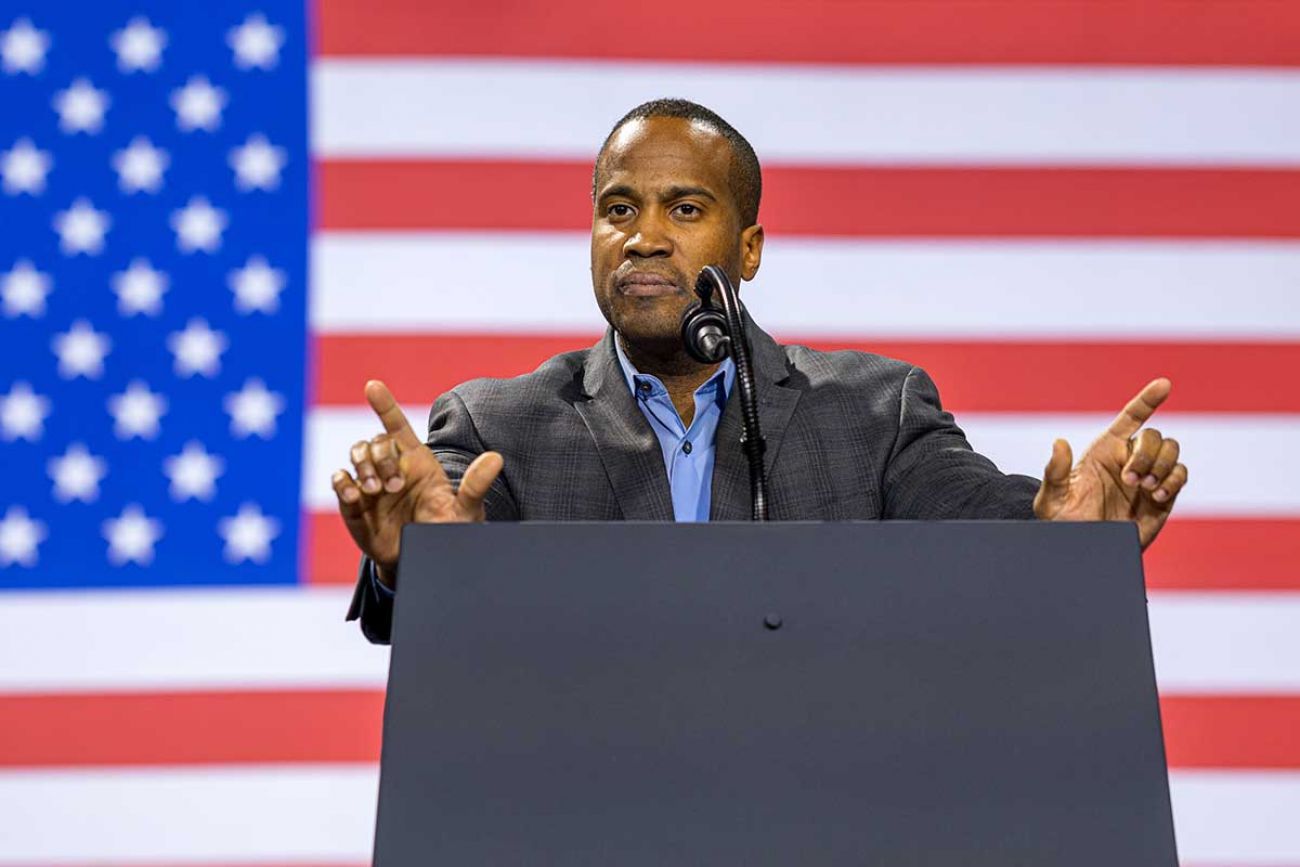Deep in Michigan’s car country, switch to EVs fuels anxieties before election

- Voters in a reliably Republican congressional district are concerned with what could happen to Michigan’s auto industry after Election Day
- Republican U.S. Rep. John James and Democrat Carl Marlinga are fighting to represent those people, saying they can assuage those fears
- Neither has particularly great name recognition among voters, however, and polling to suggest who’s in the lead is scant at best
WARREN — When it comes to Michigan’s automotive industry, retired postal worker Dave Donovan knows a lot about it.
Namely, how turbulent it can be.
“I’ve got two uncles that lost their jobs, laid off,” Donovan, a longtime Warren resident, told Bridge Michigan. Both worked at the Warren Truck Assembly Plant until each was laid off earlier this year.
Donovan lays blame at the feet of President Joe Biden, a Democrat, and his administration’s push to subsidize electric vehicle manufacturing. Stellantis announced this month that it’s investing $97.6 million in the Warren plant to add production of an electric Jeep Wagoneer.
“All this effort done, putting in effort to make electric cars? They’re having to close these plants and lay off the auto workers because it’s not getting sold.”
Donovan isn’t alone in his angst surrounding Michigan’s auto manufacturing industry. But others, even those in the district, believe the concern over jobs being lost as manufacturers pivot to cleaner, greener vehicles is somewhat overblown.
The topic has become a favored talking point for Republicans on the campaign trail, especially for former President Donald Trump, who is planning his 10th visit to Michigan this year in Warren on Friday.
“You will have no auto industry within two to three years, it’ll all be gone,” Trump said during a town hall in Flint earlier this month. “You will not have any manufacturing plants — China’s going to take over all of your business — because of the electric car and because they have the material and we don’t.”
Meet the candidates
John James, Republican: Before his election to Congress in 2022, James served as president of a supply-chain management company and CEO of a logistics services company based in Detroit. The Farmington Hills Republican also served in the U.S. military for eight years, leading two platoons in combat operations during Operation Iraqi Freedom.
Since taking office, James has sponsored bills amending the nation’s Social Security Act and enhancing security assistance to allies tackling unrest in the Middle East and North Africa. He is vice chair of the U.S. House’s Subcommittee on Water Resources and Environment and chairs the congressional Subcommittee on Africa.
James has been endorsed by the Michigan Chamber of Commerce and Detroit Regional Chamber, the Michigan Farm Bureau and the anti-abortion group Right to Life of Michigan.
Carl Marlinga, Democrat: Before becoming a judge for Michigan's 16th Circuit Court, Marlinga served as the Macomb County Prosecutor for nearly four decades and as an assistant U.S. Attorney. He left the bench to run for Congress in 2022, when he secured the 10th District Democratic nomination but narrowly lost to James in the general election.
Running again, Marlinga lists creating jobs in advanced technologies, protecting the Great Lakes and bringing “the supply chain home from China and other communist regimes” as top priorities.
He is endorsed by a number of unions including the UAW, AFL-CIO and the Michigan Education Association, as well as former Governor Jim Blanchard.
Read more about the candidates, as well as third-party contender Andrea Kirby here.
This, despite the fact officials with the state’s automotive and mobility association, MichAuto, say the assertion the automotive industry is dying is not true. Instead, group Executive Director Glenn Stevens said, recent layoffs are indicative of “typical cyclical market dynamics of the auto industry.”
While fears of a changing auto industry aren’t unique to Michigan, Trump’s message appears to be resonating with voters in areas of the state which rely more heavily on the trade — and perhaps nowhere more so than in Michigan’s 10th Congressional District.
It’s also where U.S. Rep. John James, a Farmington Hills Republican, and Democrat Carl Marlinga are jockeying for who will represent residents this November. The two previously faced off in the 2022 midterms, where James beat Marlinga by just half a percentage point.
Just over 772,000 people live in the district, which is made up of Macomb County and part of northern Oakland County. Major cities include Warren and Sterling Heights, each home to an automotive plant, as well as Mount Clemens, Rochester Hills, Shelby Charter Township and Macomb Township.
The district leans Republican, per Cook Political Report, but scant polling done in the area suggests a conservative victory may not be as cut and dried as it seems. That’s because the district is “very diverse,” said state Rep. Mai Xiong, D-Warren, which is “reflective of our country.”
Trump beat Democrat Hillary Clinton in Macomb County by double digits in 2016, 54% of the vote to her 42%. That margin of victory shrank to roughly 8 percentage points when Trump beat President Joe Biden there in 2020.
As for Oakland County, Trump lost in the region both times — by nearly 54,000 votes against Clinton in 2016, and by over 108,000 votes to Biden in 2020.
The median household income of 10th Congressional District residents is around $72,000, about $3,000 more than Michigan as a whole. Of the roughly 770,000 residents who lived in the district at the time, nearly 72% were white, nearly 14% were Black and just under 7% Asian, according to data from the U.S. Census bureau.
Among the district’s biggest employers? Manufacturing, a sector in which about 1 of every 5 residents holds a job.
It’s no surprise, then, that electric vehicles and auto manufacturing are “the most important issue in that district,” said Jamie Roe, a Republican political strategist.
“It’s not a throwaway issue here,” he said. “It’s a matter of the future … and people are rightfully concerned.”
Michigan’s 7th Congressional District
Notable communities: Warren, Sterling Heights, Clinton Township, Macomb Township, Shelby Charter Township, Rochester Hills, St. Clair Shores, Mount Clemens
Demographics: As of 2023, residents in the district had a median household income of around $72,000, about $3,000 more than Michigan as a whole. Of the roughly 770,000 residents who lived in the district at the time, nearly 72% were white, nearly 14% were Black and just under 7% Asian.
Industry: As of 2023, the district was home to roughly 389,000 workers, with around 1 in 5 holding a job in the manufacturing industry. Other large sectors included educational services, health care and social assistance.
Source: U.S. Census Bureau
A midterm rematch
James and Marlinga are no strangers to politics — nor to each other. The pair first faced off in 2022 when running to represent the newly redistricted 10th Congressional, with James winning by just 1,600 votes.
That race ended up being the third closest congressional contest in the country. This time around, it’s not expected to be any different.
Related:
- Michigan election results: Carl Marlinga wins race to take on Rep. John James
- Trump calls for 100% tariffs on cars made in Mexico
- Michigan elections FAQ: Where do Trump, Harris stand on auto industry, EVs
James, in a statement, portrayed the country’s current way of working toward an electric future as a “defacto electric vehicle mandate” from Democrats which will put auto jobs in the district at “a great risk of extinction.”
In running for reelection, he’s focused a large chunk of his time on electric vehicles and the auto industry, including using his time in office to sponsor and pass a resolution opposed to recent car emission standards proposed by the U.S. Environmental Protection Agency.

“Folks in my district simply can’t afford to spend an additional $12,000 on an expensive, unreliable EV,” James said last week, upon his resolution’s passage.
Additional incentives for buying those cars, he added, puts “all 77,580 manufacturing jobs in Michigan's 10th Congressional District at great risk of extinction.”
That messaging is on point for James, said political strategist Roe, who noted the incumbent is “getting a pretty good reaction” from voters when door knocking and is “doing what he’s got to do.”
Marlinga, meanwhile, told Bridge that he wants to do “everything possible” to increase the size and efficiency of Michigan’s auto industry, while also making sure “the government moves as fast as possible to zero emissions.”
But Marlinga, a Macomb County political veteran, pushed back on the notion of an electric vehicle mandate — a common talking point for Republicans this cycle — telling Bridge Wednesday “there’s no such thing.”

Instead, he called the sentiment behind Trump’s and James’ words “just phony Republican rhetoric.”
Before becoming a judge for Michigan's 16th Circuit Court, Marlinga served as the Macomb County prosecutor for nearly four decades and as an assistant U.S. Attorney. He left the bench to run for Congress in 2022, when he secured the 10th District Democratic nomination, though he lost in the general election.
Running again, Marlinga has listed creating jobs in advanced technologies, protecting the Great Lakes and bringing “the supply chain home from China and other communist regimes” as top priorities.
“I am aware that if we went precipitously to electric vehicles … that it could threaten auto jobs,” Marlinga said this week, adding that auto companies should be given “breathing room to develop all the ways we can reduce emissions.”
That sentiment alone is part of the reason why unions like the UAW and AFL-CIO have endorsed Marlinga for election.
Though a spokesperson for the UAW did not respond to a request for comment in time for publication, AFL-CIO President Ron Bieber told Bridge in a statement it was clear Marlinga “will fight for union workers in Congress by protecting worker pensions and Social Security, investing in American supply chains, and supporting the PRO Act.”
But even that union endorsement is a point of contention.
Auto Workers for Trump founder Brian Pannebecker said during a phone call with reporters Thursday that while the unions may be throwing themselves behind Marlinga — and by extension, Vice President Kamala Harris, who is endorsed by the UAW and AFL-CIO as well — the individual workers are not.
“I can tell you that in the UAW, the support is at least 60%, probably pushing 70%” in favor of Trump, Pannebecker said. As to why the union itself didn’t endorse Trump, he had no answer.
“I cannot understand,” Pannebecker said. “The very existence of our industry is on the line.”
Grow, or die
Whether Marlinga or James’ message is received by voters, those like 20-year-old college student Nicholas Olkowski, remains to be seen.
Olkowski, who is working toward a welding certificate at Macomb Community College, said he hasn’t made up his mind on who to vote for yet. That’s mostly because he’s still unfamiliar with either congressional candidate.
Though Olkowski’s biggest issues heading into the ballot box this year are the rising cost of living and inflation, “if the automotive industry died, that’s a lot of people out of a job.”
Sixty-four-year-old Diane Kubik sees it similarly.
Longtime owner of Max & Ollie’s Vintage Boutique in downtown Mount Clemens, Kubick said trends in the automotive industry don’t impact her personally “but it snowballs” and fewer people with jobs likely means fewer faces in her shop with money to spend.
That said, Kubik is still voting for Marlinga over James as, “I’m not really sure that John James has done anything that is helpful.”
Harris has her vote, too, with Kubik indicating she was more concerned about a potential loss of rights as a woman — not just for her, but for her friends and family as well — than the unknown future of Michigan’s auto industry.
If Trump and James are forecasting doom and gloom for the field “I want to hear his rationale for it, and I want to hear how he’s going to fix it,” Kubik said.
To Stevens, the executive director of MichAuto, the fix appears simple but is ultimately complex.
The United States currently leans on China, and to some extent Japan, to provide “critical minerals and batteries” necessary in creating electric cars, Stevens said.
While not ideal, and work is being done to address those gaps in the supply chain, the idea the country would “literally give it up to the Chinese when it comes to vehicles, let alone specifically EV vehicles, that is not an option.”
Now the state is at an inflection point when it comes to autos, Stevens said, “and when you get hit with an inflection point, you have one of two options.”
“You either figure out how to take the upward trajectory on that inflection point, or you become a victim of its impact. … You either grow or you die.”
In the meantime, that leaves people like Dave Donovan, the retired postal worker from Warren, feeling somewhat hopeless and definitely tired of politics.
“Well, you know, we can go vote all we want, but it's the people that have the money that make the rules,” he said. “We just have to hope to God we can survive.”
See what new members are saying about why they donated to Bridge Michigan:
- “In order for this information to be accurate and unbiased it must be underwritten by its readers, not by special interests.” - Larry S.
- “Not many other media sources report on the topics Bridge does.” - Susan B.
- “Your journalism is outstanding and rare these days.” - Mark S.
If you want to ensure the future of nonpartisan, nonprofit Michigan journalism, please become a member today. You, too, will be asked why you donated and maybe we'll feature your quote next time!





